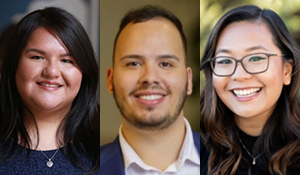Mic Drop: How Philanthropy Can Double Down on Black Liberation
I grew up in Los Angeles during the 90s, a time infamously known for deep racial strife, extreme segregation, and the proliferation of state and community violence. Historical moments such as the Los Angeles Police Department’s brutal beating of Rodney King, the resulting acquittal of the officers, and the ensuing LA uprising were all critical flashpoints that shaped my consciousness.
The inequities on display during my upbringing in LA helped me to understand how neighborhoods like mine in South Central were created as part of a long history of anti-Black systemic racism in the United States.
Now, I lead the California Black Freedom Fund (CBFF), one of the country’s largest funds for Black prosperity. Like many similarly situated funds throughout the country, CBFF was established in 2020 during the racial reckoning and the ensuing tidal wave of philanthropic support. Our nation was embroiled in protest and frustrated with the many ways our nation’s policies and systems have failed Black America.
In other words, it took a series of outrageous public murders – most notably, but certainly not limited to Ahmaud Arbery, Breonna Taylor, and George Floyd – before the philanthropic sector and the world recognized the grave circumstances facing Black Americans.
Investing in over 100 Black-led power building organizations across all issues impacting Black life in California, CBFF seeks to transform the relationship between philanthropy and Black communities by ensuring sustained investment and connection. And as we celebrate Juneteenth on June 19, we know that autonomy and sovereignty are essential to building Black power. That’s why we are moving to transform the California Black Freedom Fund into a first-in-the-nation, independent operating foundation committed to tackling the most intractable issues facing Black communities by strengthening Black-led and Black-serving organizations across the state.
The California Black Freedom Fund is unique in that our charge to invest in Black power building infrastructure seeks to ensure Black people can win decision-making power over the policies and systems that shape their lives. This requires dismantling anti-Black systemic racism and building the power of everyday Black people to participate in policy and systems change at scale.
While California has the 5th largest Black population in the country, Black power building infrastructure in California is under established and lacks investment. Black led organizations (BLOs) face a giving gap in comparison to their white peers. Despite California being the 4th largest economy in the world, the lack of funding and sustainability among BLOs mirrors the very communities they serve. This type of philanthropic segregation is shocking within a sector that exists to promote the welfare of others.
BLOs are on the frontlines in every way, and their success is integral to every measure of prosperity we care about in our great state. They are first source employers and community hubs. More than half are led by women making gender equity a central issue. Investing in BLOs grows our economy, resolves gender inequities, decreases unemployment, delivers critical services, and transforms our communities through policy and systems change. These activities benefit everyone in California, not just Black people.
Since 2020 we’ve made progress.
The California Black Freedom Fund is an example of the type of doubling down that funders all over the country should take note of, but it’s not the only one.
The Democracy Frontlines Fund, the Black Futures Co-Op Fund in Washington State, and the Minnesota Black Collective Foundation are all examples of funders innovating and holding the line for Black liberation. Institutions like the Ballmer Group and their $42 million investment in Black economic mobility along with Phil and Penny Knight’s $400 million commitment to Black Portlanders are other examples of philanthropic institutions advancing the kind of bold commitments needed to achieve Black freedom and liberation.
But our work is not done. Startlingly, too many philanthropic institutions continue to have a host of bureaucratic roadblocks that get in their way of being in relationship with BLOs, allowing the systemic inequities they combat to persist and widen. Philanthropy needs to join the movement for Black liberation and transcend its own history of indifference and inaction.
The racial reckoning and the uprisings of 2020 were a global inflection point – and an opportunity to shift power and transform the racial hierarchy in our society. However, the strength of our organizations will determine our ability to seize the moment and the opportunity.
The challenges facing Black communities are intergenerational challenges that require intergenerational commitments and institutions.
Now is the time for philanthropy to double down. Now is the time for philanthropy to dig deep and consider what it would take to expand upon the work of the past few years and ensure these critical community organizations are resilient, healthy and sustained. Philanthropy must contribute to the strength and power of BLOs working to advance a self-determined future where Black people, and all Californians thrive.











